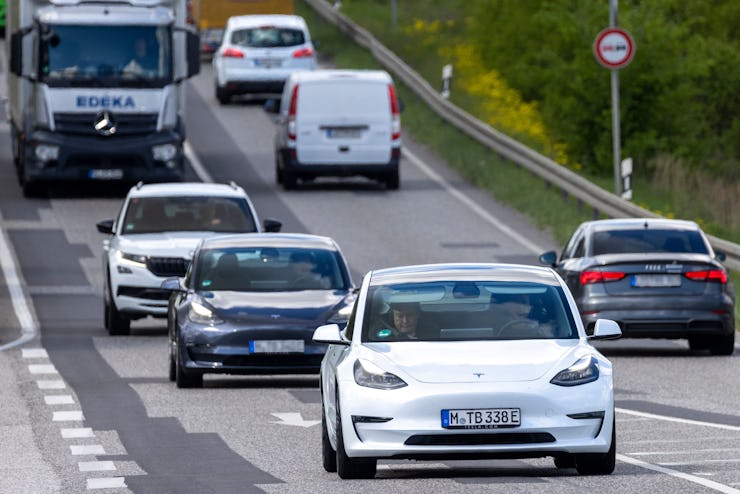Tesla: Elon Musk still gets one dangerous thing wrong about electric cars
Musk seemed confident in comments made during Tesla's Q2 call — maybe he shouldn’t be.

Tesla’s latest earnings report was a rollercoaster ride for stockholders and EV fans alike.
There were a few revelations, like vehicle delays, general production issues, and, more positively for Tesla, lots of consumer demand. But there was one thing CEO Elon Musk was particularly resolute about in his July 26 second-quarter earnings report.
“Public sentiment towards [electric vehicles] is at an inflection point,” Musk said in his opening remarks. “I think almost everyone agrees that electric vehicles are the only way forward.”
Does everyone agree with that? And are we really limited to driving around in your mom’s Toyota Prius if we want planet-friendly transportation? Let’s dive in.
The short answer is “no” — Even Musk himself understands that EVs aren’t the only answer, often coming close to reinventing public transport in the process. But as close as he gets, he usually ends up deviating and creating something much less useful. The Boring Company, for example, is described on its website as creating tunnels to “solve traffic” and “enable rapid point-to-point transportation.”
“Oh,” you say, “so like a subway?” Well... it’s actually just tunnels for Teslas. And although the loop is designed to be significantly faster than a subway, the reality at the Las Vegas Convention Center Loop, which is currently The Boring Company’s only in-operation loop, is a lot less sexy.
According to reports in 2021, the tunnel’s top speed was 40 mph, just a hair slower than some New York City subway lines that reach 45 mph, and unlike the subway, the LVCC loop was prone to traffic.
Musk has also attempted to innovate existing public transportation, but those ideas barely made it off the page. Take his Hyperloop transportation idea, which involved pods zipping passengers between destinations like a blindingly fast train. This eventually got absorbed into The Boring Company, meaning you’re chances of shooting across the country like an air hockey puck in a wind tunnel any time soon are exceedingly low.
Musk’s also brought up the idea of a Tesla bus or minivan situation multiple times since 2016, but so far, nothing has come of it.
Want to learn more about EVs, the future of Tesla, and Musk’s hand in it all? Subscribe to MUSK READS+ for exclusive interviews and analysis about Musk news, electric cars, and more.
So, about EVs — It’s possible that Musk avoids public transport because he, by his own admission, just doesn’t like it. At an event in November 2017, Musk said “public transport is painful.”
He continued:
“Why do you want to get on something [...] that doesn’t leave where you want it to leave, doesn’t start where you want it to start, doesn’t end where you want it to end? And there’s, like, a bunch of random strangers, one of [whom] might be a serial killer.”
Let’s hope that none of the random strangers currently operating LVCC Teslas are serial killers, for Musk’s sake.
Naturally, people were angry at Musk for dismissing a method of transportation that’s proven to be affordable, convenient to millions of people, and kind to the environment; but we’ll get to that in a moment. Musk doesn’t like public transit, so he gravitates towards sprucing up cars. That’s not an inherently bad thing — for people that need to drive, EVs are a great emission-free entry point into sustainable living.
But they have to be a stepping stone, not an end goal. Individual transportation leads to traffic, which causes accidents and pollution (not everyone has an EV). The United States’ fixation on cars is also a leading factor behind food deserts that leave 19 million residents without a reliable, healthy food source. (If you can’t afford a car and a bus never comes to your rural town, how do you get to the grocery store miles away?)
The list goes on: EVs are expensive, not every neighborhood has a charging station or they aren’t accessible, and EVs are often designed in ways that make driving difficult for people with disabilities.
Science: EVs aren’t perfect — This emphasis on cars is also linked to another force threatening to hurl us all into climate doom: overconsumption
Teslas may be pretty green, but manufacturing them isn’t. At least, we don’t think so. (Tesla doesn’t disclose its greenhouse-gas emissions, which doesn’t bode well for a company that keeps expanding globally.)
Studies show that producing EVs in general releases more pollution than producing traditional cars. According to Politifact, just creating a lithium-ion battery can release the same amount of CO2 you might emit while driving a gas-guzzling car for two years. It doesn’t help that Musk finds hydrogen fuel cells, a lithium-ion alternative that can be made with clean energy, “extremely silly.”
The Inverse analysis — EVs are a great alternative to traditional vehicles, but they have way too many social and technical problems to be our “only way forward.” As the climate crisis hangs ahead of us like a smoggy shadow, it’s best to carefully consider all our options instead of sticking with the convenient status quo.
SUBSCRIBE TO MUSK READS+, A PREMIUM NEWSLETTER THAT COVERS THE WORLDS OF ELON MUSK, SPACEX, TESLA, AND EVERYTHING BETWEEN.
This article was originally published on